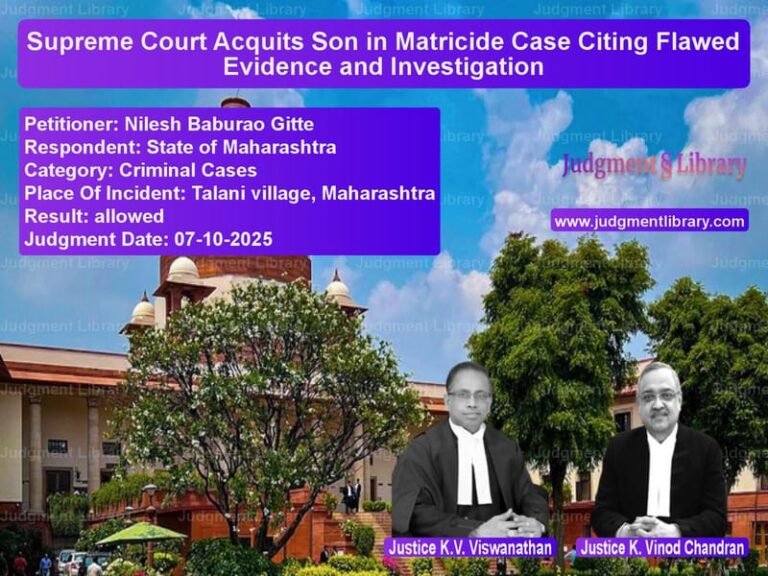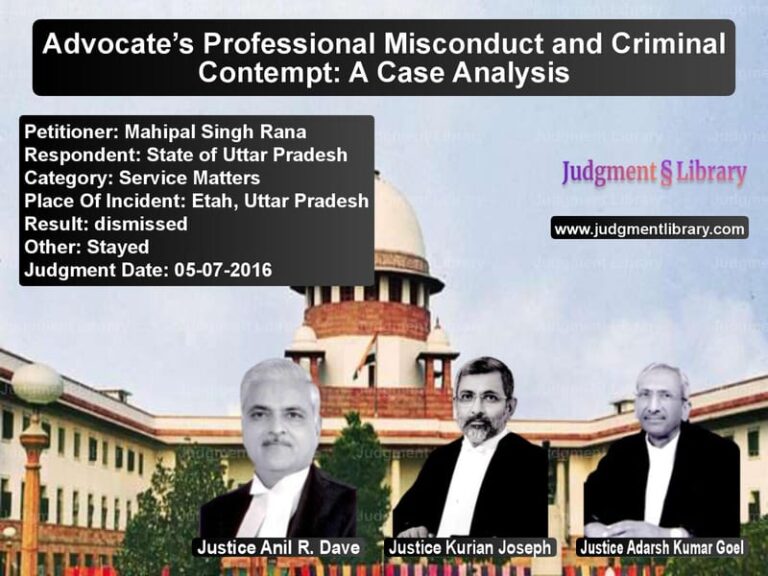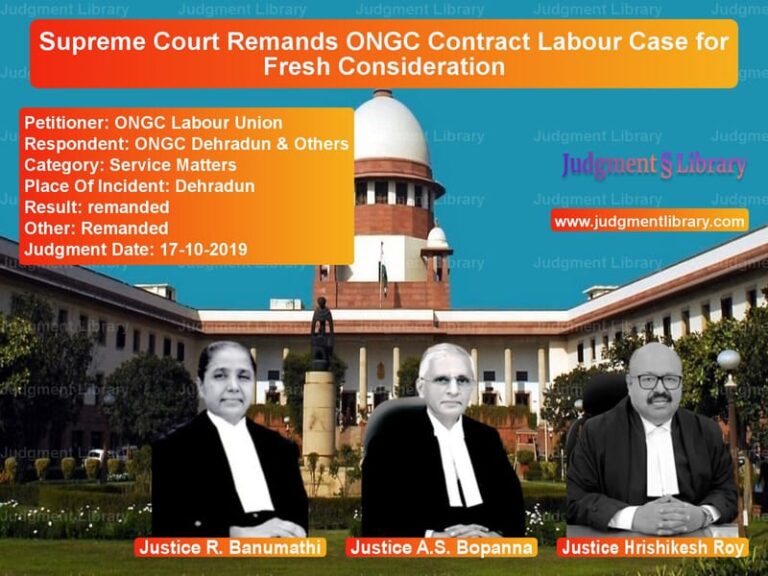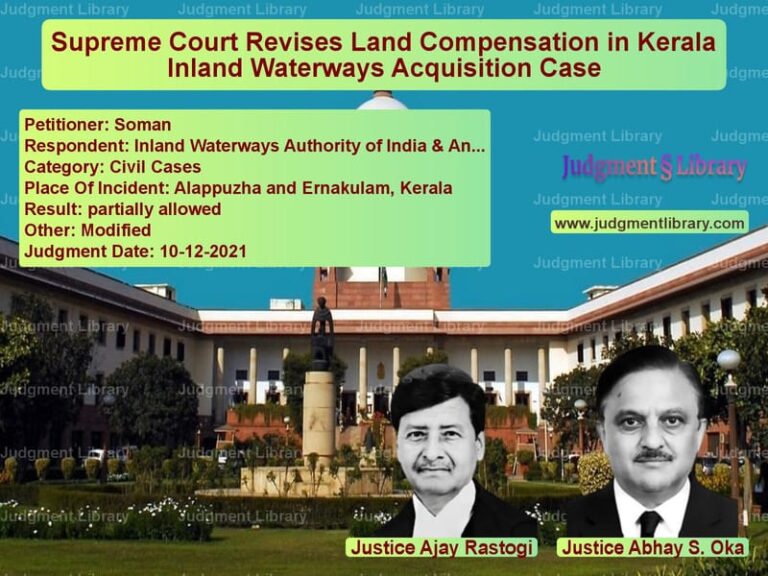Supreme Court Upholds High Court’s Decision in Rajasthan PSC Recruitment Dispute
The legal dispute in Rajasthan Public Service Commission v. Kailash Chandra Jyotishi & Others centers around the eligibility of candidates for government job recruitment and whether degrees recognized after the recruitment process had begun should be considered valid for selection. The Rajasthan Public Service Commission (RPSC) refused to consider certain candidates whose degrees were recognized post the application deadline, leading to a legal challenge that eventually reached the Supreme Court.
Background of the Case
In response to a government notification, the Rajasthan Public Service Commission (RPSC) initiated a recruitment process for multiple posts in the state administration. Several candidates, including the respondents, applied for the posts. However, at the time of their application, their degrees were not officially recognized. Due to policy changes or government notifications, their degrees were granted recognition after the application deadline had passed.
The candidates sought inclusion in the recruitment process, arguing that since their degrees were now recognized, they should be deemed eligible. The RPSC, however, refused, stating that the eligibility criteria should be judged based on the status of degrees as of the cutoff date. Consequently, the candidates approached the Rajasthan High Court, which ruled in their favor and directed the RPSC to consider them for selection.
Aggrieved by the High Court’s decision, the RPSC filed an appeal before the Supreme Court, arguing that post-facto recognition of degrees should not be permitted in recruitment processes.
Arguments of the Petitioner (Rajasthan Public Service Commission)
The RPSC presented the following arguments before the Supreme Court:
- The eligibility criteria should be based strictly on the conditions mentioned in the recruitment advertisement, which included possessing a recognized degree at the time of application.
- Allowing candidates whose degrees were recognized later would set a dangerous precedent, leading to administrative confusion and potential legal challenges in future recruitments.
- The role of the RPSC is to conduct recruitment within the policy framework defined by the state government, and it does not have the authority to change eligibility criteria retrospectively.
- The High Court’s ruling interfered with an administrative decision that should have been left to the discretion of the recruitment agency.
Arguments of the Respondents (Candidates)
The respondents countered these arguments, stating:
- The degrees obtained by the candidates were eventually recognized by the competent authority, meaning they met the required qualifications, albeit after the application deadline.
- The candidates applied in good faith, believing that their degrees would be recognized, and should not be penalized for a procedural delay.
- The RPSC’s refusal to consider them was arbitrary and contrary to the principles of fairness and equal opportunity.
- The RPSC’s function is limited to conducting recruitment; it does not have the authority to deny candidates whose eligibility has been affirmed by the state government.
Supreme Court’s Analysis and Judgment
The Supreme Court, comprising Kurian Joseph and R. Banumathi, upheld the High Court’s decision and dismissed the RPSC’s appeal, making the following key observations:
1. RPSC’s Role is Limited to Conducting Recruitment
- The Court ruled that the RPSC’s function is to conduct recruitment based on the eligibility criteria defined by the appointing authority.
- Since the state government had recognized the degrees, the RPSC had no valid reason to exclude these candidates.
2. Candidates Were Eligible at the Time of Selection
- The Court noted that the relevant factor was whether the degrees were recognized at the time of selection, not necessarily at the time of application.
- Since the degrees had been recognized by the government, the candidates met the qualifications when final appointments were being made.
3. No Disruption to Recruitment Process
- The Supreme Court rejected the argument that allowing these candidates would disrupt recruitment procedures.
- The ruling emphasized that procedural technicalities should not override substantive justice, especially in employment matters.
Final Judgment
- The Supreme Court dismissed the RPSC’s appeal and upheld the High Court’s ruling.
- The respondents were declared eligible for consideration in the recruitment process.
- The RPSC was directed to review their applications and proceed accordingly.
Implications of the Judgment
The Supreme Court’s decision sets an important precedent for recruitment disputes, ensuring that:
- Recruitment agencies must adhere to the policies of the appointing authority rather than imposing additional restrictions.
- Recognition of degrees, even if delayed, should not arbitrarily disqualify candidates.
- Judicial intervention is warranted when administrative actions violate the principles of fairness and equal opportunity.
Conclusion
This ruling underscores the principle that administrative bodies must operate within the framework established by the state and cannot make arbitrary decisions that disadvantage candidates. By ensuring that recognized degrees were considered valid for recruitment, the Supreme Court has reaffirmed the importance of fairness in public employment processes.
The judgment ensures that candidates who fulfill all qualifications at the time of selection are not unfairly excluded due to procedural delays in degree recognition. This case will likely serve as a reference in future recruitment disputes where candidates face similar issues related to evolving eligibility criteria.
Don’t miss out on the full details! Download the complete judgment in PDF format below and gain valuable insights instantly!
Download Judgment: Rajasthan Public Ser vs Kailash Chandra Jyot Supreme Court of India Judgment Dated 19-07-2017.pdf
Direct Downlaod Judgment: Direct downlaod this Judgment
See all petitions in Employment Disputes
See all petitions in Public Sector Employees
See all petitions in Recruitment Policies
See all petitions in Judgment by Kurian Joseph
See all petitions in Judgment by R. Banumathi
See all petitions in dismissed
See all petitions in supreme court of India judgments July 2017
See all petitions in 2017 judgments
See all posts in Service Matters Category
See all allowed petitions in Service Matters Category
See all Dismissed petitions in Service Matters Category
See all partially allowed petitions in Service Matters Category







